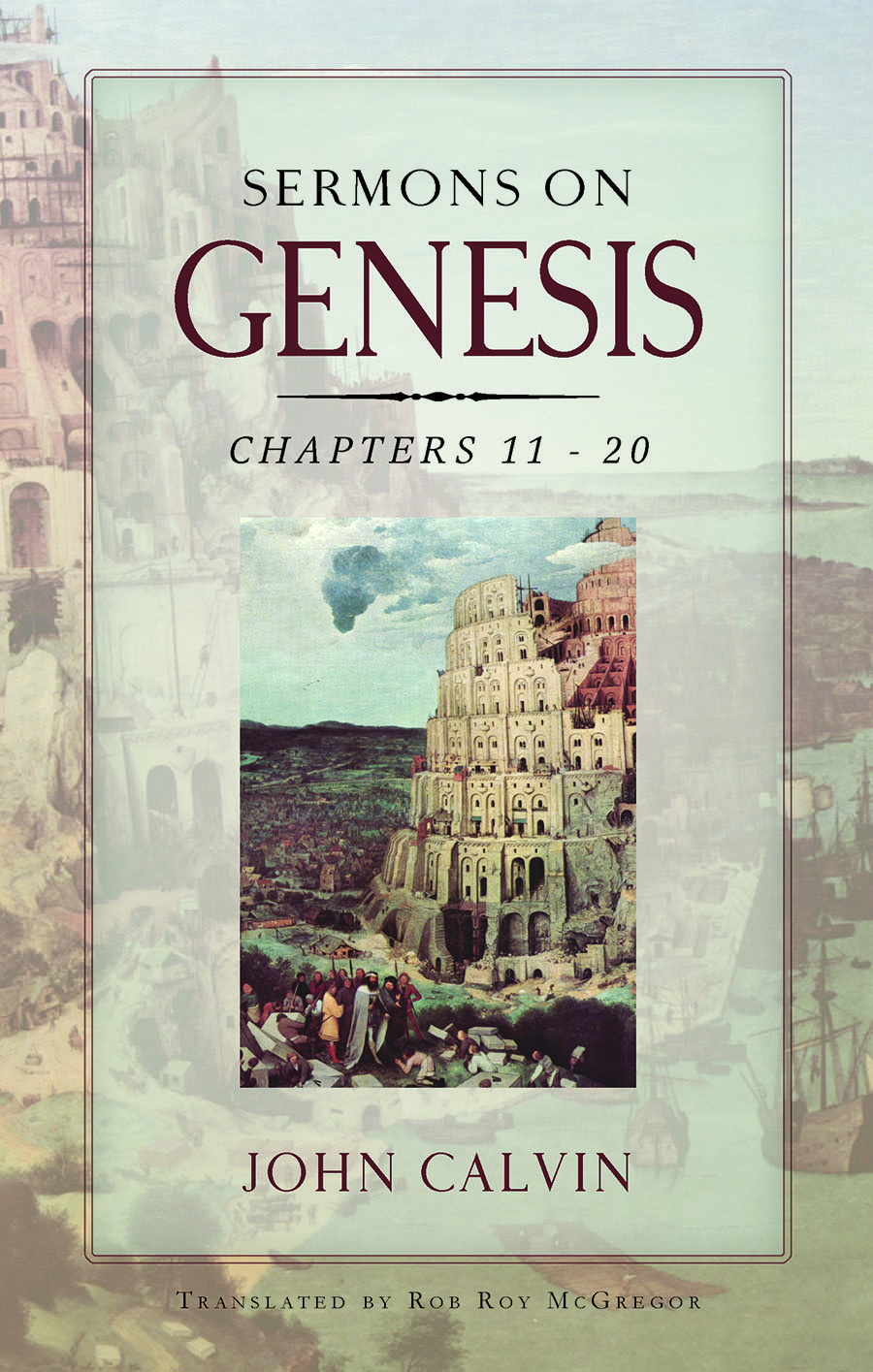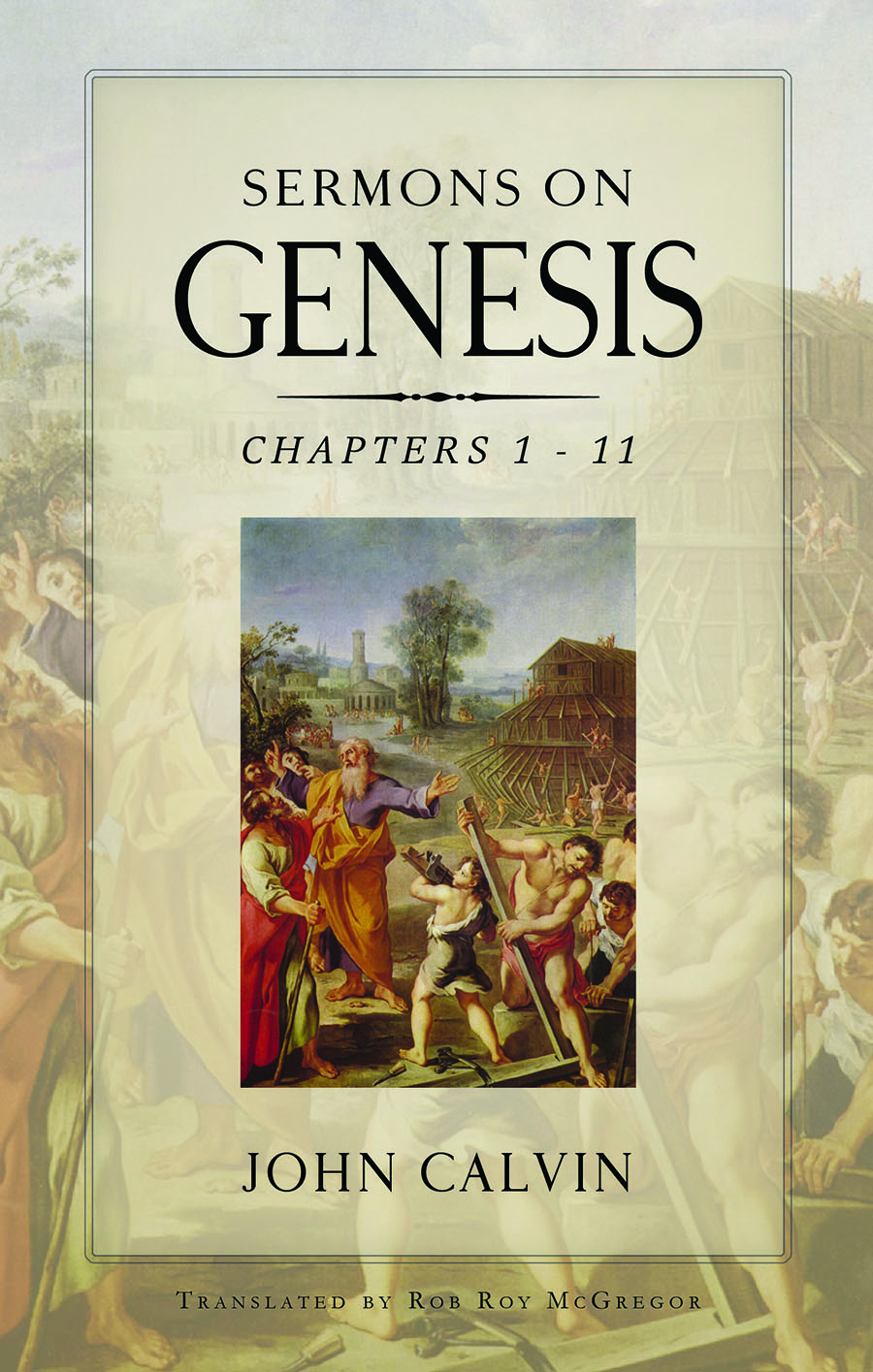Calvin’s Sermons on Genesis, 11-20 – A Review by Wilfred Weale
This1 is a second volume of sermons on Genesis which Calvin preached in St Peter’s Church to the citizens of Geneva, from 24 January to 15 May 1560. They are numbered 50 to 97 and, as was the case with the first volume,2 they are here translated into English for the first time by Dr Rob Roy MacGregor.
These sermons take us on in Genesis from the dividing of the tongues at Babel to the overthrow of Sodom and Gomorrah and are of a straightforward expository nature. Calvin, with his most fertile mind, brings out lesson after lesson from these passages in a very clear and practical way. His method is perhaps best explained by Dr MacGregor in his very helpful Introduction:
Calvin, when preaching on Genesis 11:31-12:2 and speaking of Abraham’s difficulty in leaving his own people and possessions in faithful obedience to God, provides a partial summary of his own preaching, for he always understands that the Old Testament serves to instruct the Church: ‘Let us learn from this passage . . . that when we serve God, our lives will be filled with many struggles. If we do not sense them right away, they will come eventually. So if hypocrisy is not to get the better of us, let each of us enter into ourselves, to the deepest part, and consider the things that are required for obedience to God and the obstacles the world provides, those things that are in our very selves, for no greater resistance is to be found than the resistance found in our inner selves’ (pp 52-53). Those words show Calvin is aware that as we confront the internal and external problems of ordinary life, our resident self is in a very real sense our worst enemy and that our success in Christian living depends upon sincere and intentional obedience to God’s will and call, irrespective of the material, physical and emotional demands that are made, ‘for we will never serve God without a struggle’ (p 79).
In reviewing these most edifying sermons, two areas were found especially helpful. The first was where Calvin comments on Abraham being justified by faith. He has no fewer than four sermons on justification but we confine ourselves to one quotation:
Abraham . . . already had the advantages of all virtues; he had renounced himself in order to yield fully to God. So it seems he could have some righteousness, if such existed in a living creature. And yet his faith was accounted to him as righteousness. From that Paul concludes there were no works to justify him. And when did he not have any works? After working enough to be able to serve as a pattern for all angelic virtues, in charity, in long-suffering, in obedience to God, in piety. In short he stripped himself of all affections to be fully in conformity with God’s righteousness. After doing all that, he still had nothing to boast of, as Paul says (cf Rom. 4:2). He had to remain silent until he was justified by faith (cf Rom. 3:19) (pp 325, 326).
The second area that was found especially helpful was Abraham’s question in his plea for Sodom, ‘Wilt thou also destroy the righteous with the wicked?’ (Gen.18:23). In commenting on how the righteous often seem to suffer for the sins of the wicked, Calvin says,
In fact, it is like threshing grain in the barn. The flail passes over the straw and over the grain. Both straw and grain are struck, but afterwards the wheat is gathered up and the straw is thrown on the dunghill. And then the wheat is winnowed. It is thrown into the air to remove the useless straw, but the grain is preserved. Thus our Lord will cause the flails to pass over the good, who are like the good grain; and he will also cause the wicked to undergo the same, like the straw, and on the face of it everything will be confused, but the outcome will show he has not forgotten his own. So that comparison is true when it is well understood. God would have to renounce himself if he destroyed the good along with the wicked. [pages 700-701]
This is just a very small sample of the treasures to be found in these sermons. The only small thing the reviewer found to be rather irritating was the frequent use of slang expressions. Perhaps the blunt language of Calvin to the people of Geneva could best be brought out by these expressions and, as Calvin himself puts it,
when we come to preaching, we are not to seek to be soothed or stroked or have our ears tickled with quaint speculations, but [we are] to allow the preacher to get under our skin, so we will be pierced, cut to the quick, and deeply wounded, and have to take bitter medicine and sometimes pass through fire and searing reproaches so that everything will be cut off from the corruption in us; otherwise, there would be no Christianity in us (p 406).
However, for those of us not used to such phrases they can be somewhat irksome!
That apart, we highly commend this volume and heartily concur with the translator: ‘These sermons will provide Christians at all levels of spiritual development with important insights and emphases for preaching, teaching, and living the truth of God’s Word as revealed in the book of Genesis and beyond’ (p xi).
Notes

Sermons on Genesis
Chapters 11-20
price £20.00Description
This1 is a second volume of sermons on Genesis which Calvin preached in St Peter’s Church to the citizens of Geneva, from 24 January to 15 May 1560. They are numbered 50 to 97 and, as was the case with the first volume,2 they are here translated into English for the first time by Dr Rob Roy […]

Sermons on Genesis
Chapters 1 - 11
price £20.00Description
This1 is a second volume of sermons on Genesis which Calvin preached in St Peter’s Church to the citizens of Geneva, from 24 January to 15 May 1560. They are numbered 50 to 97 and, as was the case with the first volume,2 they are here translated into English for the first time by Dr Rob Roy […]
Wilfred A. Weale is pastor of the Free Presbyterian Church in Staffin on the Isle of Skye. This review is taken with permission from The Free Presbyterian Magazine, January 2013.
Latest Articles
Finished!: A Message for Easter 28 March 2024
Think about someone being selected and sent to do an especially difficult job. Some major crisis has arisen, or some massive problem needs to be tackled, and it requires the knowledge, the experience, the skill-set, the leadership that they so remarkably possess. It was like that with Jesus. Entrusted to him by God the Father […]
Every Christian a Publisher! 27 February 2024
The following article appeared in Issue 291 of the Banner Magazine, dated December 1987. ‘The Lord gave the word; great was the company of those that published it’ (Psalm 68.11) THE NEED FOR TRUTH I would like to speak to you today about the importance of the use of literature in the church, for evangelism, […]
